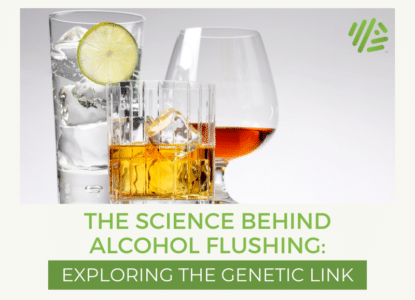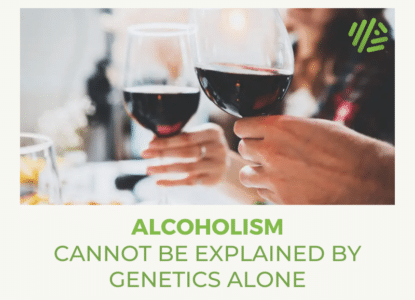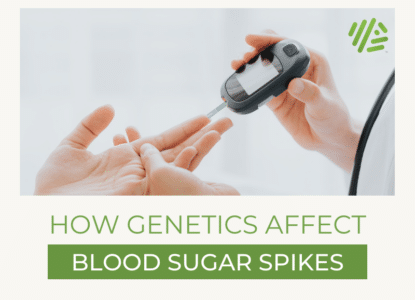Why I Gave Up Alcohol For One Year
Article at a Glance
- The research our team has done at Gene Food on the genetics of alcohol metabolism opened my eyes to the long-term risks associated with drinking, even when you have a “good tolerance.”
- That and the incompatibility of social drinking and getting up early with toddlers made me quit drinking for at least one year.
Genes Mentioned

While making dinner in late December, I had two glasses of sake and a beer. We live at 6,000+ feet above sea level.
At 3:15 AM, I was awoken by my wife, who came down with a stomach bug that our 2-year-old brought home. I am mildly hungover and feeling nauseous myself.
As it slowly dawned on me that I would be tending to my wife and 8-month-old son alone for the next several hours, I asked myself a simple question.
Why in the world did I have sake with dinner last night?
My upcoming night shift was rough but doable. Unfortunately, having had a “few beers” made things more challenging.
Sure, I had family in town, but there is always an excuse to drink. Deviating from the norm, a glass or two of red wine, left me hungover, and feeling rough. It didn’t help help that my wife was vomiting in our adjoining bathroom.
At that moment, I decided to use my New Year’s resolution on alcohol, specifically no alcohol for one year. As I write this, I’m 5 months in and have no plans of turning back anytime soon.
But isn’t alcohol healthy?
The fact that people in the Blue Zones, the parts of the world where people live to be 100 more often, tend to drink wine is compelling. David Katz has written convincingly in favor of imbibing on occasion, arguing everything has risk, and alcohol is no different.
I certainly think it’s possible to be healthy when drinking in moderation, but it’s harder, especially as a parent with toddlers who get sick all the time and who wake up at dawn.
The sobering fact about alcohol is that, no matter how it is packaged and branded, it is a toxin.
I have been deep in the weeds on alcohol metabolism with our research team, and Blue Zones notwithstanding, acetaldehyde, the direct bi-product of alcohol metabolism, is a carcinogen right there with benzene.
Acetaldehyde (ethanal) is an aldehyde that is highly reactive and toxic. Acetaldehyde causes damage at the cellular and genomic levels. The sheer number of enzymes involved in the metabolism and detoxication of acetaldehyde and other aldehyde species is a testament to the impact of its reactivity.
Ben de Lacy Costello, Norman M. Ratcliffe, in Volatile Biomarkers, 2013
Alcohol tolerance and long term risk
My short-term alcohol metabolism is robust, meaning I have a “good tolerance,” but it turns out this isn’t necessarily a good thing.
I will hunt for the quote, but I remember stopping in a bookstore once and skimming Christopher Hitchen’s book on death. In it, he documents what it feels like to lose a battle with cancer. He laments robust his robust alcohol metabolism, arguing that sensitivities of certain types act as warnings, and that immediate feedback can be a useful messenger.
It’s almost as if Hitchens, after a life of heavy drinking, looks back at booze as a clever adversary. For some of us, it doesn’t announce as the murderous toxin it is. Just because we tolerate a drink better than others doesn’t mean drinking is good for us.
It likely killed Hitchens, and it is harming many of us in a “death by a thousand cuts” kind of way right now.
Am I a better father because of alcohol?
Am I more effective at my job because of drinking alcohol?
In my business, alcohol flush and poor ethanol metabolism is often dismissed as an East Asian problem. But this is far from the truth. Having a flushing response to alcohol is a wonderful stop sign – a useful messenger. An immediate bad reaction to alcohol is one of the biggest factors scientists can use to decipher who won’t become an alcoholic and disulfiram, a medication used to treat alcohol use disorders, modifies alcohol metabolism to mimic the flushing reaction.
Those who carry variants associated with poor short-term alcohol metabolism are less likely to drink because the way alcohol is metabolized in the short term makes drinking less enjoyable.
Those who “deal well with alcohol,” like me, metabolize acetaldehyde more effectively in the short-term. This is a blessing and a curse. Yes, it allows you to drink socially and participate in certain social scenes, but excellent short-term alcohol metabolism is associated with big increases in cancer risk.
After looking at the research on alcohol metabolism and seeing how incompatible even a mild hangover is with parenting toddlers, I gave up alcohol for a year. The last 5-months have been more productive; my mood and energy are more stable, and I generally feel much more clear-headed.
I might never drink again.



